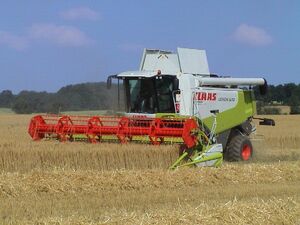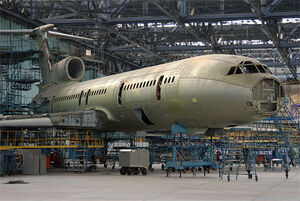| Economy of Westland | |
|---|---|
| Rank | 46th (PPP) |
| Currency | Westlandic Mark (VSM) |
| Trade organisations | WTO, OECD |
| Statistics | |
| GDP | $375 Billion (PPP) |
| GDP per capita | $28,905 (PPP, 37th) |
| GDP by component | Agriculture: 19%, Industry: 65%, Services: 16% (2015 est.) |
| Labour force by occupation |
Agriculture: 25%, Industry: 55%, Services: 20% (2015 est.) |
| Unemployment | Negligable |
| External | |
| Public finances | |
| All values, unless otherwise stated, are in US dollars | |
The Economy of the Westlandic People's Republic is based upon a system of joint public and state ownership of the means of production, collective farming, industrial manufacturing and centralised economic planning. The economy is characterised by state control of investment, public ownership of industrial assets, high economic stability, negligible unemployment and high job security. The small free market in the Service Sector of the economy, allows for the circulation of goods and money on a small business basis, with minimal foreign investment and corruption. Westland implements the economic ideologies of Strassonism and Distributism. Westland is a developed country with a modern mixed economy.
Since 1923, the course of the Westlandic economy has followed consistend Decade Long Plans, published by the government's Industry and Finance Ministry in association with, and approved by, the Chancellor. These plans set out the course of the Westlandic economy for the next ten years, with the first being published in 1930, following 7 years of the "Work Toward Socialism Plan" which began in 1923 which forged the foundations of Westland's socialist economy.
The main focus sectors of the Westland economy are Manufacturing, Agriculture, and the Service Industry, which has seen significant growth since the 1970's with the adoption of more market oriented policies in the sector which has allowed for the establishment of independent small and medium businesses.
Overview[]
Infrastructure[]
Natural Resources[]
Naturally, Westland has limited sources natural resources. The most abundant and important to the economy of these is Westland's fertile soils, which allow national agriculture to be highly productive and create a self-sufficient Westland. Excessive harvesting of Westland's Timber resources have resulted in a depletion of total forest coverage, which has also made way for arable land under the main focus of creating a self-sufficient agricultural sector. However severe political opposition during the latter decades of the 20th century has led to the a fall in the production of timber and the forestation of zoned areas in an attempt to regain Westland's forest coverage.
Today, much of Westland's non-renewable natural resources have been exhausted due to excessive mining and depletion during the 19th and early 20th centuries to fuel Westland's Industrial Revolution. Historically, Westland was notable for its deposits of Tin, and Coal, however these have been entirely depleted.
However notable deposists of several important minerals are still actively mined and quarryed today including Limestone, Clay, Chalk, Aggregates and Peat, and still employ a considerable chunk of Westland's workforce. Peat production is still a major industry on the Sommasӓt Levels.
Sectors[]
Agriculture[]

Combine Harvester in a field of Wheat
Agriculture is orgnanised in a system of collective farms, known as 'Rikfarms'. Agriculture in Westland is highly mechanised and organised on a large scale, and as a result, Westland is fully self-sufficient for food supplies. Bad harvests, however, during the years of 1980-1985 saw a slow in the production of food, and necessitated imports of food from the Soviet Union. These farms produce anything from grains, meats, diary products or fruits and vegetables.
The most commonly farmed animals in Westland are Cows, Chickens and Pigs, and Sheep. Highly productive mechanised agricultural practices increase the usable crop from arable land. It is illegal to use harmful pesticides and fertilisers in Westland, and only organic and tested and proven safe chemicals may be used. The main agricultural focus of Westland is in the cultivation of cereals, alongside Wheat, Potatoes, and Corn, production of Cider and Cheese are also integral parts of the Westlandic agricultural sector, being major exports. 25% of the labour force, predominantly in the 16-30 age groups are involved in the agricultural sector.
Manufacturing[]

Westland has a relatively large aviation industry
As of 2015, Manufacturing and Industry is the largest sector of the economy, and accounts for approximately 65% of Westland's GDP, and employs 55% of Westland's workforce. While in many other societies, the Service sector has surpassed the Industrial sector, Westland's government has put emphasis on production and self-sufficiency. Today, the majority of products that are used in Westland are produced domestically, anything from home appliances, to aircraft and vehicles are produced by a specific Collective.
The majority of manufacturing takes place within publicly owned collective factories and prodcuction facilities, however the government has permitted some foreign corporations to undertake enterprises in Westland, these include C&J Clark and Volkswagen Group in an attempt to create more revenue from foreign companies. Foreign companies operating Westland are however extremely constrained and regularly undergo ethics checks and corruption examinations.
Services []
The Service Sector in Westland is far smaller than it is in other developed countries, making up only 16% of the GDP, and employing 20% of the workforce. The Service Sector is the only sector of the economy which operates in a free market style. It has grown rapidly since market oriented reforms during the 1980's in an attempt to alleviate the lack of consumer goods. Individual citizens can begin small businesses, such as shops, resturaunts and bars that are run for a profit. The local small business sector of the industry is commonly associated with being the least 'corrupt' by the Westlandic government. Limited medium size enterprises are also committed, such as contractors and small firms, however administration is undertaken by the Office of Free Enterprise which keeps close checks on their operations. In additon, several foreign retail companies have been permitted to open branches in Westland.
Tourism[]
Foreign Trade[]
Currency []
Property[]
See Also[]
| |||||||||||||||||||||||||||||||||||
